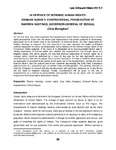In Defence of Intrinsic Human Rights: Edmund Burke’s Controversial Prosecution of Warren Hastings, Governor-General of Bengal
| dc.contributor.author | Monaghan, Chris | |
| dc.date.accessioned | 2017-03-20T16:53:28Z | |
| dc.date.accessioned | 2017-04-11T08:27:11Z | |
| dc.date.available | 2017-03-20T16:53:28Z | |
| dc.date.available | 2017-04-11T08:27:11Z | |
| dc.date.issued | 2011 | |
| dc.identifier.citation |
Monaghan, C. (2011) ' In Defence of Intrinsic Human Rights: Edmund Burke’s Controversial Prosecution of Warren Hastings, Governor-General of Bengal', Law, Crime and History, 1(2), pp.58-107. Available at: https://pearl.plymouth.ac.uk/handle/10026.1/8864 | en_US |
| dc.identifier.issn | 2045-9238 | |
| dc.identifier.uri | http://hdl.handle.net/10026.1/8864 | |
| dc.description.abstract |
For the first time, this article examines the impeachment trial of Warren Hastings from a human rights perspective. Even now, the seven year impeachment trial retains a degree of controversy, particularly as to its merits, and to the motivation of Edmund Burke, the man responsible for holding Hastings to account. The trial resulted in the clash between the reality of Britain's colonial expansion for many contemporaries and a defence of the intrinsic human rights of the Company's Indian subjects. If for many, it is debatable as to how successful Burke was in raising awareness of 'human rights' and whether the impeachment trial brought about any tangible results; this article argues not only that Burke's awareness of 'human rights' as a concept which could be defended by a court of law was for the late eighteenth century revolutionary but also that its legacy has a current resonance. In order to address these issues an exploration is provided of the events which gave rise to the impeachment, namely the role of Edmund Burke, and the political and moral concerns surrounding the East India Company's administration of a substantial part of modern India and Bangladesh. The political attempts to hold the Company to account will also be discussed, with particular reference as to why Burke felt the need to impeach Hastings. Finally, consideration will be given to the use of impeachment as a method of accountability and parallels that can be drawn with the modern inquiry and the human rights dimensions thereto. | en_US |
| dc.language.iso | en | en_US |
| dc.publisher | University of Plymouth | |
| dc.rights | Attribution 4.0 International (CC BY 4.0) | * |
| dc.rights.uri | https://creativecommons.org/licenses/by/4.0/ | * |
| dc.subject | Warren Hastings | en_US |
| dc.subject | human rights | en_US |
| dc.subject | East India Company | en_US |
| dc.subject | Edmund Burke and impeachment | en_US |
| dc.subject | Chilcot Inquiry | en_US |
| dc.title | In Defence of Intrinsic Human Rights: Edmund Burke’s Controversial Prosecution of Warren Hastings, Governor-General of Bengal | en_US |
| dc.type | Article | en_US |
| dc.type | Article | |
| plymouth.issue | 2 | |
| plymouth.volume | 1 | |
| plymouth.journal | SOLON Law, Crime and History |



